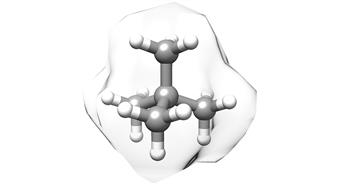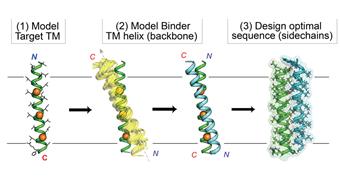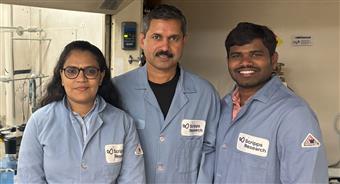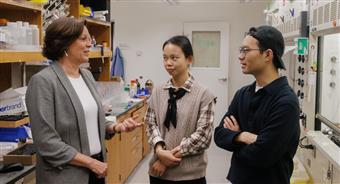
New screening method identifies potential anticancer compounds that reawaken T cells The technique may be useful in developing new combination-immunotherapy regimens against cancers and persistent infections.
December 03, 2019
LA JOLLA, CA Scientists at Scripps Research have developed a method for rapidly discovering potential cancer-treating compounds that work by resurrecting anti-tumor activity in immune cells called T cells.
Cancerous tumors often thrive because they render T cells dysfunctional or exhausted. The new method uncovers medicinal compounds that can restore the function of these T cells, making cancers vulnerable to them again.
The approach, described in a study published in Cell Reports, may also help restore T-cell responses to persistent infections from viruses or other pathogens. It therefore should speed the development of new cancer and infectious-disease immunotherapies, including those that can be combined with existing immunotherapy drugs to enhance their effects. The scientists demonstrated the potential utility of the approach by using it to rapidly screen a collection of more than 12,000 drug compounds uncovering 19 that can reawaken exhausted T cells.
This new screening method should be particularly useful because we can use it not only to identify compounds that restore needed function to exhausted T cells, but also to quickly analyze these T cells to determine how these compounds work on them, says senior author Michael Oldstone, MD, Professor Emeritus in the Department of Immunology and Microbiology at Scripps Research.
The new screening system and to some extent, the wider field of cancer immunotherapy is based in part on research over the past several decades by Oldstone's laboratory and several former lab members including Rafi Ahmed, David Brooks, and John Teijaro, along with other scientists that have conducted animal-based research on how the immune system responds to lymphocytic choriomeningitis virus (LCMV).
A unique variant of LCMV known as clone 13 establishes a persistent infection by exhausting the virus-specific T cells that are required to clear the infection. It does this by boosting signals through T-cell receptors such as PD-1 and IL-10. The discovery that LCMV clone 13 can survive by switching off anti-LCMV T cells was quickly followed by the recognition that cancers often persist using the same trick.
Immunotherapies that block signaling from PD-1 or similarly acting receptors to restore T cells' anti-cancer responses are among the most powerful cancer medicines available today. These therapies save many patients who in the past had seemingly untreatable tumors. But because treatment with these drugs typically works well for only a few cancers, including melanoma and less often on other cancers scientists suspect that cancers usually hijack multiple inhibitory T-cell pathways. This suggests that a combination of immunotherapies directed to different molecular pathways could be more effective than the current therapy.
The idea now is to develop more immunotherapy drugs and find the best combinations of them, Oldstone says.
A promising hit
The new screening system is designed to enable scientists to swiftly find such drugs in this case, pharmacologically active small-molecule compounds that might work better than, or augment, the current injectable antibody immunotherapies now available.
The system uses T cells that have been exhausted by LCMV clone 13 and detects signs of renewed activity in these cells when a tested compound works to reawaken them. An advantage of the new screening system is that it is specific and highly automated; thus, thousands of compounds can be tested within days, with the hits verified in experiments involving mice.
Oldstone and colleagues applied the new screening system to a drug repurposing library of more than 12,000 compounds that either are FDA-approved or have been tested as potential drugs. They quickly identified 19 hits compounds that, at modest doses, can effectively resurrect the activity of exhausted T cells.
One of these compounds, ingenol mebutate, is a plant-derived molecule that is already used in gel form (Picato) to treat actinic keratosis, a pre-cancerous skin condition. The researchers employed elements of their screening system to study the reactivated T cells and determined that ingenol mebutate restores function for these cells largely by activating signaling enzymes called protein kinase C enzymes, a known pathway of activity for this compound.
Co-first authors of the study, postdoctoral fellows Brett Marro, PhD and Jaroslav Zak, PhD, in the Department of Immunology and Microbiology, are currently collecting and exploring the therapeutic potential of other reported hits that may work in combination with treatments that block PD-1- and another T-cell-inhibitory receptor, CTLA-4. Indeed, one such hit in combination with antibody to PD-L1 is already undergoing evaluation in patients.
Oldstone notes that the new screening approach is flexible enough to adapt for finding compounds that have other effects on T-cells, such as reducing T-cell activity to treat autoimmune conditions.
Authors of the study, Discovery of Small Molecules for the Reversal of T Cell Exhaustion, also included Scripps Research scientists Reza Beheshti Zavareh, a postdoctoral fellow in the Lairson laboratory, and Luke Lairson, an associate professor in the Department of Chemistry.
Support for the research was provided by the National Institutes of Health (R01 AI099699, AI009484, AI123210 & AI118862, R21 AI141842).
Cancer Oldstone, Michael
More from Scripps
12/04/2024
Scripps Research chemists devise easier new method for making a common type of building block for drugs Scientists transform simple linear amines into saturated...
06/04/2024
A simple, inexpensive way to make carbon atoms bind together A Scripps Research team uncovers a cost-effective method for producing quaternary carbon molecules,...
04/04/2024
Developing a vaccine for the zombie drug xylazine Scripps Research chemical biologists design an early proof-of-concept vaccine that could lead to the first...
30/03/2024
How blocking a neural receptor responsible for addiction could reduce alcohol use A Scripps Research team found that a new therapeutic that targets the kappa op...
13/03/2024
New computational strategy boosts the ability of drug designers to target proteins inside the membrane Customized-design approach could streamline the design of...
29/02/2024
Scripps Research scientists reveal how first cells could have formed on Earth New phospholipid discovery brings researchers closer to understanding how primordi...
29/02/2024
How molecular handedness emerged in early biology Scripps Research chemists fill a major gap in origin-of-life theories.
February 28, 2024
LA JOLLA, CA Mole...
22/02/2024
Snaking toward a universal antivenom Scripps Research scientists discovered antibodies that protect against a host of lethal snake venoms.
February 21, 2024
...
06/02/2024
Calibr-Skaggs announces expansion of option and license agreement with AbbVie to develop novel cell therapies for solid tumors and autoimmune diseases
AbbVie...
26/01/2024
Re-energizing mitochondria to treat Alzheimer's disease Scripps Research team restored neuron-to-neuron connections in human cells.
January 25, 2024
LA JO...
24/01/2024
100 years of Science Changing Life: Scripps Research celebrates a century of transforming human health For the last century, institute leaders and renowned scie...
23/01/2024
New technology lets researchers track brain cells' off switches The method could shed light on what goes awry in numerous brain conditions when neurons ar...
09/01/2024
Three decades of giving: Announcing the Calibr-Skaggs Institute for Innovative Medicines The ALSAM Foundation, founded by the Skaggs family, provides lasting g...
04/01/2024
Life science entrepreneur Gene Lay joins Scripps Research Board of Directors Lay, founder of the global biotech company BioLegend, brings invaluable experience ...
21/12/2023
Taming a plant-derived toxin Scripps Research team modifies the traditional poison picrotoxinin for potential neurological drugs and anti-parasite treatments. ...
19/12/2023
Scripps Research Executive Vice President Eric Topol gives TED talk on transformative power of AI in medicine Topol provides an overview of how AI models can i...
13/12/2023
New AI-powered algorithm could better assess people's risk of common heart condition Early detection of atrial fibrillation can reduce the risk of stroke an...
07/12/2023
Nanoparticle flu vaccine design shows promise in early tests Scripps Research-designed vaccine could provide broad, enduring protection against influenza A str...
16/11/2023
Numerous Scripps Research scientists named Highly Cited Researchers Clarivate's annual, global list represents researchers who have demonstrated significant...
07/11/2023
Multiple sclerosis drug invented at Scripps Research slows long-term devastating disease progression Late-breaking data reinforces the effectiveness and safety ...
05/10/2023
Keren Lasker named a 2023 Moore Inventor Fellow The prestigious award will support Lasker's inventive research in membraneless organelles and their applica...
22/09/2023
Michael Bollong named a 2023 Amgen Young Investigator The prestigious award will support Bollong's research identifying new molecular targets and therapeuti...
09/09/2023
Philip Dawson receives 2024 American Chemical Society National Award Dawson is honored with the Arthur C. Cope Late Careers Scholar Award for his foundational c...
07/09/2023
Scripps Research chemists devise a method for C-H activation of alcohols The method represents a new toolkit for making drugs and other compounds.
September 06...
31/08/2023
Scripps Research receives $1.5M to surveil infectious disease threats in wastewater Bill & Melinda Gates Foundation award to support the development of multi-pa...
16/08/2023
How cold temperatures trigger the brain to boost appetite Scripps Research scientists' discovery could lead to new weight loss and metabolic health treatmen...
08/08/2023
Human antibody that targets carfentanil, fentanyl and related opioids reverses overdose effects in preclinical study Scripps Research-developed antibody therapy...
04/08/2023
How sensory neurons impact the gut Scripps Research scientists show that the receptor PIEZO2 in sensory neurons controls gut motility and transit time, which a...
26/07/2023
AbbVie and Calibr Expand Strategic Collaboration to Advance Several Preclinical and Early-stage Clinical Assets The expanded strategic collaboration will advan...
23/07/2023
Scripps Research scientists develop AI-based tracking and early-warning system for viral pandemics Machine-learning system effectively predicts emergence of pro...
19/07/2023
Monitoring T cells may allow prevention of type 1 diabetes Scripps Research study shows that analyzing T cells in blood samples could be used to select at-risk ...
19/07/2023
Scripps Research mourns passing of leading organic chemist Albert Eschenmoser Eschenmoser pioneered key reactions in synthetic chemistry and shaped the understa...
15/06/2023
Scripps Research awarded $46.8 million by NIH to promote human health through innovative translational science and training The Translational Institute is harne...
13/06/2023
Scripps Research's Danielle Grotjahn named 2023 Pew Scholar in the Biomedical Sciences The award will support Grotjahn's study of how cells assemble the...
31/05/2023
Crossing the ring: new method enables C-H activation across saturated carbocycles Scripps Research chemists add another powerful tool to their molecular editin...
24/05/2023
Scripps Research develops behind-the-scenes tool for better biomedical data discovery The new resource makes datasets more discoverable for life science communi...
19/05/2023
Scripps Research neuroscientist Hollis Cline elected to American Academy of Arts and Sciences Cline is recognized for her discoveries about the role of sensory ...
19/05/2023
Scripps Research's Skaggs Graduate School awards doctoral degrees to 31st graduating class Commencement ceremony will be livestreamed via Zoom and on instit...
13/05/2023
A better route to benzocyclobutenes, sought-after building blocks for drugs Scripps Research chemists devise a new, C-H activation-based method for the synthesi...
09/05/2023
Renowned Scripps Research professor Jeffery Kelly elected to National Academy of Sciences Kelly's groundbreaking work on protein misfolding has led to thera...
28/04/2023
Mirror-image molecules pave new path for cancer drug discovery By comparing how mirror image versions of small molecules impact clusters of proteins, Scripps R...
22/04/2023
How alcohol consumption contributes to chronic pain A Scripps Research team showed how both alcohol intake and alcohol withdrawal can lead to increased pain and...
21/04/2023
Xin Jin receives dual awards to study autism risk genes in neurodevelopment Major grants from the National Institutes of Health and California Institute for Reg...
20/04/2023
Trim the sugar: New HIV vaccine design improves immune response Scripps Research vaccine candidate headed for clinical trials.
April 19, 2023
LA JOLLA, CA A...
18/04/2023
Therapeutic can seek and destroy potent opioid to treat overdoses Scripps Research chemists developed a new biologic to work against the synthetic opioid carfen...
07/03/2023
How heavy alcohol consumption increases brain inflammation The findings by a Scripps Research team point toward a potential new drug target for treating alcohol...
02/03/2023
Scientists find human antibodies that can block multiple coronaviruses including SARS-CoV-2 Results from a Scripps Research and UNC team pave the way for a vacc...
28/02/2023
$10 million grant funds Scripps Research Alcohol Research Center through its 50th year The five-year grant supports research into the neurobiology of alcohol us...
28/02/2023
Immune system drug shows promise in treating alcohol use disorder, a Scripps Research clinical trial reports Scientists at Scripps Research found that apremilas...
23/02/2023
Chemically poisoned protein acts as a molecular switch to spur cancer formation The discovery triggered development of a new potential drug to eliminate tumor...
 New screening method identifies potential anticancer compounds that reawaken T cells The technique may be useful in developing new combination-immunotherapy regimens against cancers and persistent infections.
New screening method identifies potential anticancer compounds that reawaken T cells The technique may be useful in developing new combination-immunotherapy regimens against cancers and persistent infections.
























